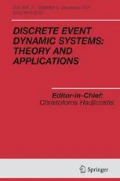Abstract
In many practical systems, the control or decision making is triggered by certain events. The performance optimization of such systems is generally different from the traditional optimization approaches, such as Markov decision processes or dynamic programming. The goal of this tutorial is to introduce, in an intuitive manner, a new optimization framework called event-based optimization. This framework has a wide applicability to aforementioned systems. With performance potential as building blocks, we develop two intuitive optimization algorithms to solve the event-based optimization problem. The optimization algorithms are proposed based on an intuitive principle, and theoretical justifications are given with a performance sensitivity based approach. Finally, we provide a few practical examples to demonstrate the effectiveness of the event-based optimization framework. We hope this framework may provide a new perspective to the optimization of the performance of event-triggered dynamic systems.









Similar content being viewed by others
Notes
If policy d is a random policy that picks each action with positive probability (i.e., d(i) is a probability distribution over \(\mbox{$\cal A$}\) that specifies the probabilities of the actions adopted when state i is visited), then a sample path under policy d visits all the state-action pairs (i, a), \(i \in \mbox{$\cal S$}\), \(a \in \mbox{$\cal A$}\). Therefore, \(Q^d_N(i,a)\) for all the state-action pairs (i, a), \(i \in \mbox{$\cal S$}\), \(a \in \mbox{$\cal A$}\), can be estimated without using the randomizing techniques.
References
Altman E (1999) Constrained Markov decision processes. Chapman & Hall/CRC
Altman E, Avrachenkov KE, Nún̋ez-Queija R (2004) Perturbation analysis for denumerable Markov chains with application to queueing models. Adv. Appl. Probab. 36:839–853
Bertsekas DP, Tsitsiklis JN (1996) Neuro-dynamic programming. Athena, Belmont, MA
Barto A, Mahadevan S (2003) Recent advances in hierarchical reinforcement learning. In: Special issue on reinforcement learning. discrete event dynamic systems: theory and applications 13:41–77
Cao XR (1994) Realization probabilities—the dynamics of queueing systems. Springer, New York
Cao XR (2005) Basic ideas for event-based optimization of Markov systems. Discrete Event Dynamic Systems: Theory and Applications 15:169–197
Cao XR (2007) Stochastic learning and optimization—a sensitivity-based approach. Springer, New York
Cao XR, Chen HF (1997) Potentials, perturbation realization, and sensitivity analysis of Markov processes. IEEE Trans Autom Control 42:1382–1393
Cao XR, Zhang JY (2008) Event-based optimization of Markov systems. IEEE Trans Autom Control 53:1076–1082
Cao XR, Ren ZY, Bhatnagar S, Fu M, Marcus S (2002) A time aggregation approach to Markov decision processes. Automatica 38:929–943
Ho YC, Cao XR (1991) Perturbation analysis of discrete event systems. Kluwer Academic Publishers, Norwell
Jia QS (2011) On solving event-based optimization with average reward over infinite stages. IEEE Trans Autom Control 56:2912–2917
Leahu H, Heidergott B, Hordijk A (2013) Perturbation analysis of waiting times in the G/G/1 queue. Discrete Event Dyn Syst Theory Appl 23:277–305
Marbach P, Tsitsiklis JN (2001) Simulation-based optimization of Markov reward processes. IEEE Trans Autom Control 46:191–209
Parr RE (1998) Hierarchical control and learning for Markov decision processes. Ph.D. Dissertation, University of California at Berkeley
Puterman ML (1994) Markov decision processes: discrete stochastic dynamic programming. Wiley
Sutton RS, Barto AG (1998) Reinforcement learning: an introduction. MIT Press, Cambridge, MA
Wang DX, Cao XR (2011) Event-based optimization for POMDP and its application in portfolio management. In: The Proceedings of the 18th IFAC World Congress, 28 Aug–2 Sept 2011. Milano, Italy, pp 3228–3233
Whitt W (1978) Approximation of dynamic programs, I. Math Oper Res 3:231–243
Whitt W (1979) Approximation of dynamic programs, II. Math Oper Res 4:179–185
Xia L (2012) Optimal control of customer admission to an open Jackson network. In: The Proceedings of the 31st Chinese Control Conference, 25–27 July 2013. Hefei, China, pp 2362–2367
Xia L (2013) Event-based optimization of admission control in open queueing networks. Discrete Event Dyn Syst Theory Appl. doi:10.1007/s10626-013-0167-1
Xia L, Cao XR (2012) Performance optimization of queueing systems with perturbation realization. Eur J Oper Res 218:293–304
Yao C, Cassandras CG (2012) Using infinitesimal perturbation analysis of stochastic flow models to recover performance sensitivity estimates of discrete event systems. Discrete Event Dyn Syst Theory Appl 22:197–219
Zhao Y, Yan CB, Zhao Q, Huang N, Li J, Guan X (2010a) Efficient simulation method for general assembly systems with material handling based on aggregated event-scheduling. IEEE Trans Autom Sci Eng 7(4):762–775
Zhao Y, Zhao Q, Guan X (2010b) Stochastic optimal control for a class of manufacturing systems based on event-based optimization. In: Huang J, Liu K-Z, Ohta Y (eds) Theory and applications of complex systems and robust control. Tsinghua University Press, Beijing, China, pp 63–83
Author information
Authors and Affiliations
Corresponding author
Additional information
This work was supported in part by the 111 International Collaboration Project (B06002), National Natural Science Foundation of China (60704008, 60736027, 61174072, 61203039, 61221003, 61222302, 90924001), Tsinghua National Laboratory for Information Science and Technology (TNList) Cross-discipline Foundation, the Specialized Research Fund for the Doctoral Program of Higher Education (20070003110, 20120002120009). This work was also supported in part by the Collaborative Research Fund of the Research Grants Council, Hong Kong Special Administrative Region, China, under Grant No. HKUST11/CRF/10.
Rights and permissions
About this article
Cite this article
Xia, L., Jia, QS. & Cao, XR. A tutorial on event-based optimization—a new optimization framework. Discrete Event Dyn Syst 24, 103–132 (2014). https://doi.org/10.1007/s10626-013-0170-6
Received:
Accepted:
Published:
Issue Date:
DOI: https://doi.org/10.1007/s10626-013-0170-6




